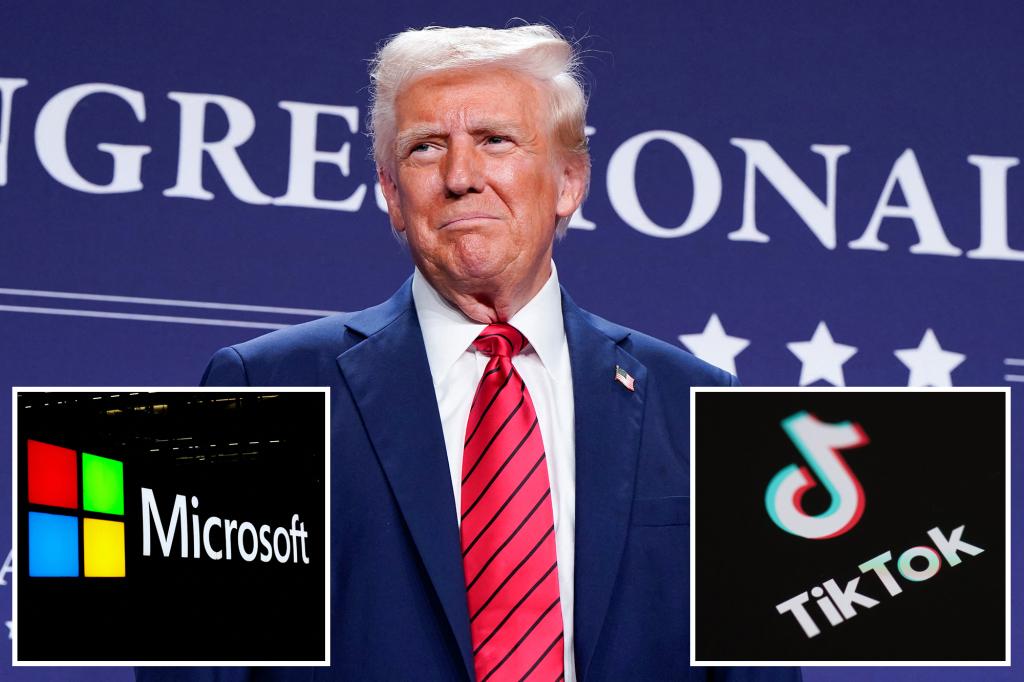The fate of TikTok, the popular Chinese-owned social media app, hangs in the balance amidst ongoing negotiations and potential bidding wars involving major American corporations. President Trump’s recent statements have shed light on the evolving situation, indicating that Microsoft is a potential buyer and expressing his hope for a competitive bidding process to secure the best deal. The backdrop of these developments is the Trump administration’s national security concerns regarding TikTok’s Chinese ownership and the potential for data exploitation. This concern prompted an initial ban on the app, later postponed, and a push for ByteDance, TikTok’s parent company, to divest a significant portion of its ownership to an American entity.
President Trump’s comments suggest a shift from an outright ban towards facilitating a sale to an American company. His preference for a “bidding war” underscores his aim to maximize the benefits for the US, potentially including financial gains, increased control over data security, and the preservation of TikTok’s presence in the American market. This approach contrasts with the initial hardline stance of banning the app entirely. The president’s public pronouncements serve to both confirm Microsoft’s interest and potentially attract other bidders, leveraging market dynamics to achieve a more favorable outcome. The implication is that a sale to a US company would address the underlying security concerns, allowing TikTok to continue operating under American oversight.
The narrative surrounding TikTok’s future in the US has been dominated by national security concerns related to data privacy and potential Chinese government influence. The Trump administration’s initial ban, later postponed, reflected these apprehensions, echoing concerns voiced by lawmakers and intelligence agencies about the potential for data collection and surveillance of American users. The proposed solution of a partial or majority sale to an American company aims to mitigate these risks by placing the app’s operations and data management under US control. This approach seeks to strike a balance between addressing national security concerns and avoiding an outright ban of a popular social media platform. The ongoing negotiations and potential bidding war highlight the complexity of navigating these competing priorities.
Several other players have been mentioned as potential bidders in the acquisition of TikTok, further fueling the possibility of a competitive bidding process. These include a group led by billionaire Frank McCourt, former owner of the Los Angeles Dodgers, and another involving popular YouTube streamer Jimmy Donaldson, known as Mr. Beast. The emergence of multiple potential buyers suggests a significant interest in acquiring TikTok despite the surrounding controversies. This interest underscores the app’s value as a major social media platform with a large and engaged user base. The diversity of potential buyers, ranging from established corporations like Microsoft to individuals with significant financial resources, adds another layer of complexity to the unfolding saga. The ultimate outcome will likely depend on factors such as the offered price, the proposed ownership structure, and the ability to satisfy the Trump administration’s national security requirements.
Despite the administration’s focus on national security, President Trump has also expressed skepticism about the severity of the data privacy risks posed by TikTok. In a recent interview, he questioned the importance of China spying on young people consuming entertainment content on the app, seemingly downplaying the potential for data exploitation. This apparent contradiction between the administration’s actions and the president’s statements adds to the ambiguity surrounding the situation. While the administration has taken steps to address potential security risks, the president’s remarks suggest a less urgent view of the threat. This dissonance may reflect a broader debate about the balance between national security and individual privacy in the digital age.
The ongoing negotiations and potential bidding war over TikTok highlight the increasing scrutiny of Chinese technology companies operating in the US. The Trump administration’s actions reflect a growing concern about data security and potential foreign influence in the tech sector. This heightened scrutiny is likely to extend beyond TikTok and affect other Chinese companies operating in the US, particularly those dealing with sensitive data or infrastructure. The case of TikTok serves as a prominent example of the challenges faced by Chinese companies seeking to navigate the complex geopolitical landscape and gain a foothold in the American market. The outcome of the TikTok negotiations will likely have broader implications for the future of US-China relations in the technology domain.










